Posts by Christopher Lochhead
140 Built, Not Born w/ Self-Made Billionaire Tom Golisano, Founder Paychex
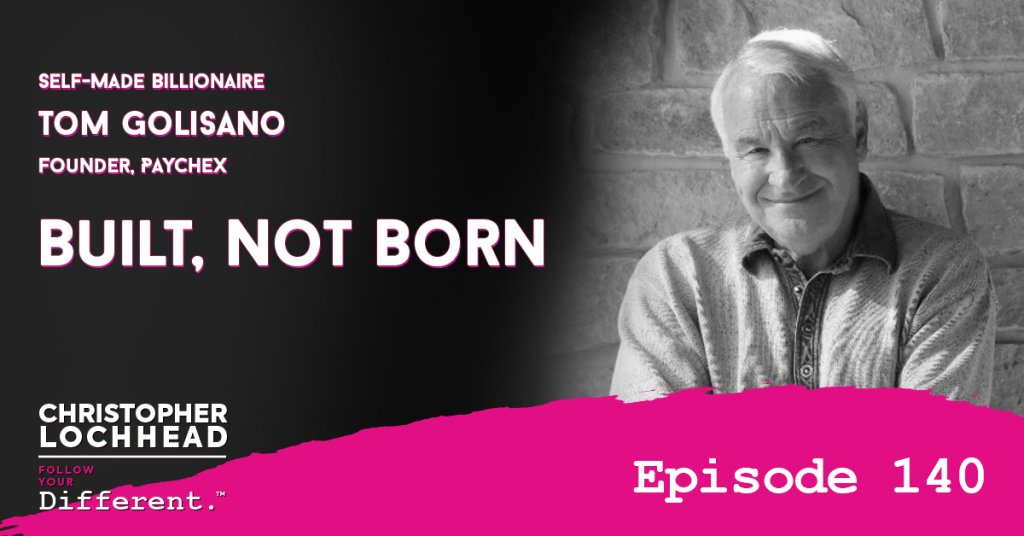
Podcast: Play in new window | Download (Duration: 38:09 — 17.5MB) | Embed
Subscribe: Apple Podcasts | Spotify | Pandora | RSS | More
Today, we speak with self-made Billionaire, Founder of $30B market cap, Paychex. You’re gonna love this guy! He has a new book: Built, Not Born: A Self-Made Billionaire’s No-Nonsense Guide for Entrepreneurs. We dig into the book and his insights on why and when you start a company. He also talks about how to build a long-term, successful business and what important steps to take before marriage.Encourager of Entrepreneurs
Tom found himself as an encourager of entrepreneurs. He understood why people evaluate whether they want to become an entrepreneur or not. He knew that there are a lot of things to take into account, such as risk and hardships exclusive to entrepreneurship. As risks would be evident in any career, Tom shares that sometimes it is even riskier to work for somebody than it is to be your own entrepreneur. Besides, a business can serve as an heirloom or an asset that one can resell.“If your business concept is well thought off, and you are very well qualified to run your little company, your medium-sized company, whatever. then I think that’s the best of both worlds.” – Tom Golisano
Wise Words For Entrepreneurs
Aside from a winning concept for an enterprise, Tom shares entrepreneurs must have industry knowledge. Before launching Paychex, he used to sell accounting machines while working for a payroll processing company that caters to large corporations. He believes this industry knowledge affected his success.“Anybody who is considering being an entrepreneur, the first thing that I would ask is ‘what’s your industry knowledge?’ You know about this industry, you’re getting into that you could absolutely make a difference or are you gonna end up getting a very serious or costly education because you got into something you really did understand?” – Tom Golisano
Sales Management is a Must
For Tom, Sales management is one of the biggest issues with entrepreneurs. Most entrepreneurs mask the issue, saying its a “cashflow problem” but in reality, the company is not making enough sales. Tom advises entrepreneurs to start making calls and to immerse themselves as much to learn about the sales process.“You’re not gonna be able to develop a good sales team unless you have that knowledge yourself. You might as well dig right into it. start making sales presentations and sales calls, and if you still don’t think you’re the right person to be doing that, at least you’ll be in the position to train somebody you hire to perform that function.” – Tom GolisanoTo hear more about Tom’s stories about what it’s like being married to Tennis Legend, Monica Seles, philanthropy, investment strategy and many more, download and listen to this episode.
Bio:
Thomas Golisano — entrepreneur, philanthropist, and civic leader — is the founder and chairman of the Board of Paychex, Inc., headquartered in Rochester, New York. With more than 12,000 employees and 100 office locations nationwide, Paychex is a leading national provider of payroll, human resource, and benefit outsourcing solutions for more than a half-million small and medium-sized businesses. Tom Golisano served as Paychex’s president and chief executive officer from 1971, when he founded the company, until October 2004. Mr. Golisano and Paychex have consistently been recognized by the business, financial and national media. Mr. Golisano was listed among the FORBES top 10 bosses in the U.S. for three consecutive years, beginning in 2002; the annual ranking is based on chief executives who provide the best balance between their compensation and shareholder return. In February 2020, his first book, Built, Not Born was launched, providing Tom Golisano’s trademark direct and often humorous style, and no-nonsense advice across all phases of business ownership. Mr. Golisano has demonstrated an ongoing dedication and commitment to a variety of civic issues and organizations. In 1985 he launched his first philanthropic endeavor by establishing the Golisano Foundation, which awards grants to organizations providing opportunities for those with intellectual disabilities. His philanthropic contributions, both personal and through the Golisano Foundation, have totaled approximately $300 million helping hospitals, educational institutions and many other organizations. In recognition of his achievements and endeavors, Golisano has received numerous awards and holds honorary doctorate degrees from five different colleges and universities. Mr. Golisano is a member of the board of directors of several private companies and institutions. He is the former owner the Buffalo Sabres of the National Hockey League, which he purchased on March 14, 2003, demonstrating his commitment to Western New York and the region’s economic climate. Mr. Golisano said that it was important to keep the team in Buffalo because it is an economic and community asset. Mr. Golisano sold the team in 2011 with the stipulation that the team remain in Western NY. Born in Irondequoit, New York, Mr. Golisano graduated from Alfred State College in 1962 with a degree in general business management. He was presented an honorary doctorate of humane letters, at his alma mater’s commencement ceremony, on May 17, 2009. Mr. Golisano is married to Monica Seles, professional tennis player and member of the International Tennis Hall of Fame. He has two children and several grandchildren.Links:
Tom Golisano We hope you enjoyed this episode of Follow Your Different™! Christopher loves hearing from his listeners. Feel free to email him, connect on Facebook, Twitter, Instagram and subscribe on iTunes!139 World Without Waste w/ Steve Pratt CEO of AI Startup Noodle
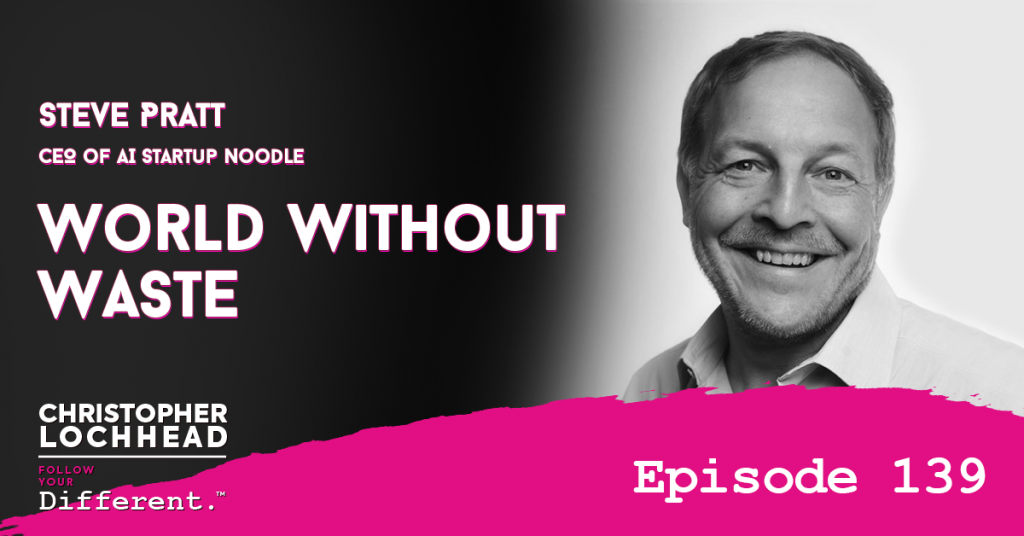
Podcast: Play in new window | Download (Duration: 59:58 — 82.7MB) | Embed
Subscribe: Apple Podcasts | Spotify | Pandora | RSS | More
This is our second in our two-part series on Digital Business, with Steve Pratt, CEO of Noodle.AI, the remarkable startup on a mission to changing global manufacturing and supply chain business.
We have a real conversation about how the combination of Machine Learning / AI, The Cloud, IoT and deep data analytics can come together to reduce both economic and environmental waste.
In case you missed the first part of this two-part series with Business Guru Big Ben Rewis, check it out: Episode 138.
Missionary CEO
Christopher has known Steve for over 30 years. He has a vast and impressive experience in digital marketing, starting with the creation of CRM business for Deloitte. He was also the founder and CEO of the InfoSys Consulting Practice and he also led IBM Watson’s initiatives.
Steve has deep experience in building and managing massively successful, deep technology businesses. He has some powerful insights, through his company Noodle.Ai, into how modern technology can reduce economic and environmental waste. This is what Christopher calls a great example of a missionary CEO, where the E stands for Evangelist.
“The intention of the company is to apply data science to create a world without waste. We reject this notion, historically, that you had to choose between profits and the planet.” – Steve Pratt
World Without Waste
Steve shares how companies have scaled things right now. They have created amazing hyper-growth for their companies, but have also accumulated huge amounts of waste.
“We have over 500 billion dollars of excess inventories sitting in warehouses. We got 50% of trucks driving around, empty. We have about 400B dollar of stuff, that is thrown out in the manufacturing process because of quality defects. These are all preventable.” – Steve Pratt
A lot of people analyzed where the waste is in the world and over 90% of the waste in the world is due to manufacturing and logistics. Steve points out that due to bad computations, companies are manufacturing trillion dollars of goods and let it sit in their storage, because they couldnt get it out to the market.
Environmental Sustainability
Steve shares about steel manufacturing company Big River Steel, which they granted a lead certification for environment sustainability.
“With our applications, that consumption to reduce inventory levels, reduce quality defects and they are the most profitable, per employee, the highest profit per mil hour, the lowest environmental impact of any steel known in the world.” – Steve Pratt
Christopher and Steve then discussed that companies should analyze data that is readily available to them. This is can easily be achieved through the help of various technologies available.
To hear more about how digital businesses can achieve a world without waste and other insights of Steve, download and listen to this episode.
Bio:
Stephen is an instigator, agitator, and pioneer in creating world-class technology services organizations.
He has spent his career building innovative ways to create value for the world’s most important organizations.
Prior to Noodle, he was responsible for all Watson implementations worldwide for IBM Global Business Services.
He also was the founder and CEO of Infosys Consulting, a Senior Partner at Deloitte Consulting, and a technology and strategy consultant at Booz, Allen & Hamilton.
He twice has been selected as one of the top 25 consultants in the world by Consulting Magazine.
He has Bachelors and Masters degrees in Electrical Engineering from Northwestern University and The George Washington University focused on Satellite Communications.
For fun, Steve plays competitive tennis, races sailboats, and formerly was a crazed rugby player. He enjoys playing acoustic guitar for his children (not ready for prime time).
Links:
We hope you enjoyed this episode of Follow Your Different™! Christopher loves hearing from his listeners. Feel free to email him, connect on Facebook, Twitter, Instagram and subscribe on iTunes!
138 Digital Business Guru Big Ben Rewis
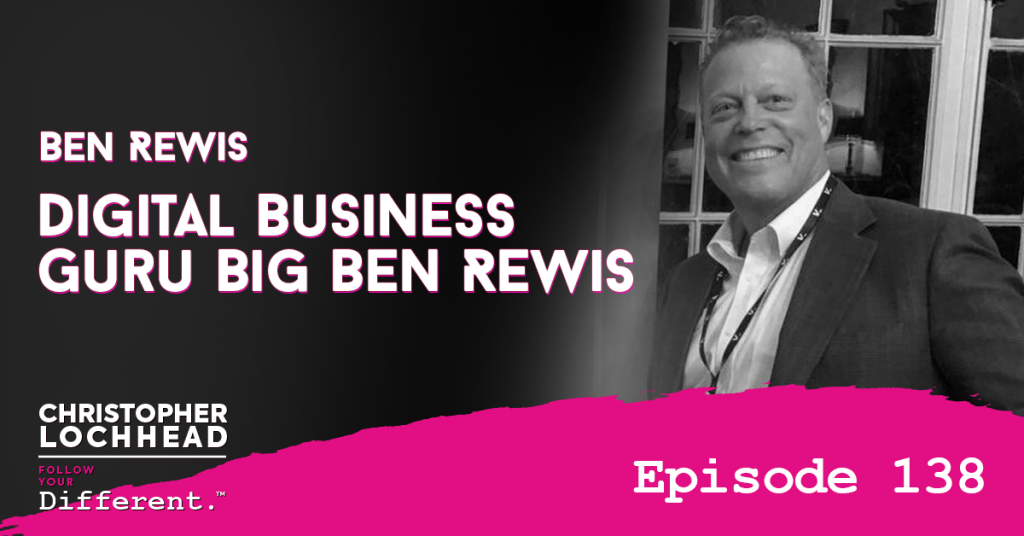
Podcast: Play in new window | Download (Duration: 1:05:16 — 149.7MB) | Embed
Subscribe: Apple Podcasts | Spotify | Pandora | RSS | More
This is our first in a special two-part series on Digital Business. The legendary Big Ben Rewis joins us today to have a real, powerful conversation about digital businesses today and how big data can contribute to sustainability.
In our next episode, watch out for Steve Pratt CEO of Noodle.AI, the remarkable startup changing global supply chains.
Surfer, Snowboard, Advisor
Big Ben is one of the most extraordinary adventure athlete’s of this time. He is a skier, snowboarder, sailor, and surfer. In fact, one of his first few sponsors were Jake Burton, the founder of Burton Snowboards.
Today, when he’s not surfing or on some kind of adventure, Ben Rewis would most likely be dishing digital business advice to Fortune 100 companies and startups in Silicon Valley. He has deep experience in building and managing massively scalable digital business and payments infrastructure.
Digital Business Guru
Just to name a few of Ben’s contributions, he created the Internet e-Commerce team for Visa. He was also Head of Security & Fraud Technology for First Data and he’s an advisor to a startup Verdant Robotics, a startup doing amazing things with AI & Machine Learning in the smart agriculture category.
“I think there’s a lot of themes, there’s a lot of organizational and technical similarity across all of them. The whole notion of data in the digital business is just fascinating, what’s happening in the industry today. Cause you know, like the industry quote ‘software is eating the world.’” – Ben Rewis
Digital Business is the Future
Digital businesses are not brand new, as they have been around a long time.Ben now shares that people are realizing the by-product of their digital business can infect more businesses.
“Digital businesses don’t necessarily have new value-added services that are data-based. They may have a legacy product or service, that is digital and they realizing that the data that is produced by that service can help them generate new revenues, or cut costs.” – Ben Rewis
To hear more about how digital businesses can greatly influence sustainability efforts for the future and other insights of Ben, download and listen to this episode.
Bio:
Ben Rewis was raised in New England north of Boston, the eldest son of two high school teachers.
After graduation from The Stowe School in VT., he moved to San Francisco, CA at age 17 and have been in technology ever since.
Today, he’s an advisory consultant to startup CEOs, and a deep payments expert with solid leadership and innovation skills.
Facilitator, speaker, communicator, thinker and doer, able to bring different constituencies together around a common digital business vision and set of deliverables.
Able to drive from big picture down to concrete initiatives. Passionate about helping teams solve challenges for strategic alignment.
In addition to his business involvement with major companies, he has decades of wilderness and group leadership experience, becoming an Outward Bound instructor at age 21, and taking part in numerous adventure expeditions around the world.
He’s crossed deserts and canyons, sailed the Tasman Sea, and climbed mountains like McKinley.
He enjoys just about all board sports, competed in the first world championships for snowboarding, and learned to surf at age 40.
Ben co-founded the Drop In Coalition, and is an Advisory Board Member of the Save The Waves Coalition, and was honored in 2019 as a Royal Geographic Society Fellow.
Links:
We hope you enjoyed this episode of Follow Your Different™! Christopher loves hearing from his listeners. Feel free to email him, connect on Facebook, Twitter, Instagram and subscribe on iTunes!
137 Sex & Intimacy w/ Alice Little #1 Companion At Moonlite Bunny Ranch

Podcast: Play in new window | Download (Duration: 43:02 — 59.4MB) | Embed
Subscribe: Apple Podcasts | Spotify | Pandora | RSS | More
This is a very special episode and a very different episode. Part 1 was with Intimacy Coach Allana Pratt. Today, for Part 2 in our series on Intimacy and Sex, we welcome Alice Little, legal sex worker and #1 Luxury Companion at the Moonlite Bunny Ranch in Carson City, Nevada USA.
We get into it! Why Alice loves her job, why she says it’s all about connection, communication, and intimacy, what it’s like to use her service and why nothing is too kinky!
Job Unlike Any Other
Alice describes herself as a legal sex worker, sex educator, and intimacy expert. She used to travel in the Midwest, educating about sex until she was introduced to brothels. She found out that brothels are a unique place to work. All other sex workers have different work experiences from each other
“My job very much so isn’t just sex. It’s so much more than that. It’s communication, connection, intimacy and teaching people how to love themselves.” – Alice Little
Radical Self-Acceptance
From a different perspective, she shares that one of the things she does is to teach people how to connect to their bodies, through radical self-acceptance. Through the acts of connection with clients, Alice shares it gives them the ability to connect deeper with themselves and appreciate who they are.
When asked what it is liked to have sex with her, Alice nonchalantly shared it’s life-changing.
“Oftentimes it changes the entire way people have sex moving forward. Like when is the last time you asked your partner and say ‘show me what feels nice’ and people say ‘oh shit, I have literally never uttered those words in the bedroom. I barely had sex with the lights on, let alone had a conversation while getting into that’ and I enable people to do that. It is really eye-opening.” – Alice Little
Stigma With Sex
Alice continued to share her views about sex, and she says it is something highly stigmatized in this country. A brothel is a safe place for Alice, where people can ask questions and expect not to be judged. Nothing is taboo and there is no judgment in brothels.
“I’m very, very comfortable helping people and enabling them to explore things that they probably couldn’t in their day to day lives.” – Alice Little
Alice shared a lot about the process of booking appointments, touring the ranch and the types of experiences she offers. Pay special attention to her advice on how we can improve our sex lives. She even talks about how she markets herself and her marketing advice for you.
To listen more about Alice’s advice on intimacy and sex, download and listen to this episode.
Bio:
Alice Little is the highest-earning sex worker in the United States. Little wrote in a Huffington Post op-ed that she makes $1 million per year from working in Nevada.
Little is a native of Ireland and moved to the U.S. at the age of 5 and grew up in Lond Island, New York. Thanks to her 2017 article, “A Week as a Legal Sex Worker In Mound House, NV, On A $267,000 Salary, and appearances on Tim Ferris’s podcast, Little has become a well-known advocate for sex workers across the world.
Little began her career as a sex worker at the Sagebrush Ranch in 2015. In 2017, Little moved to the Moonlite Bunny Ranch where she was the most booked sex worker in the United States for two years in a row.
Links:
Youtube: Moonlite Bunny Ranch Tour with Alice Little
We hope you enjoyed this episode of Follow Your Different™! Christopher loves hearing from his listeners. Feel free to email him, connect on Facebook, Twitter, Instagram and subscribe on iTunes!
136 Intimacy & Sex w/ Allana Pratt

Podcast: Play in new window | Download (Duration: 56:22 — 77.8MB) | Embed
Subscribe: Apple Podcasts | Spotify | Pandora | RSS | More
Yup, we’re doing it! For this week, we have a two-part special on Intimacy and Sex. In this episode, everyone’s favorite intimacy guru and coach, Allana Pratt.
This conversation is a wonderful, magical mystery tour about intimacy, pain, pleasure, how we actually feel through our hearts, and a lot more! Pay special attention toward the end, when Allana gives her ideas for some fun things to do with your partner on Valentine’s day!
Next episode, watch out for Alice Little, the two-time, #1 Companion of the Year at Nevada’s Moonlite Bunny Ranch. It is everything you ever wanted to know about her profession and what she thinks you can do to spice up your sex life.
Valentine’s Day is Stupid
The conversation started off with Allana sharing her thoughts about the upcoming Valentine’s Day. As much as it feels like an obligation for couples to spend, she also shares its a good holiday to make an extra effort for partners.
“I think Valentine’s day is a manufactured, stupid-marketing-hiccup-the-prices-of-roses-and-restaurants and it generally pisses most people off as it feels like an obligation, right?” – Allana Pratt
Every day is Valentine’s Day
Valentine’s day is a great opportunity to remind ourselves that we might have been taking our partners for granted. Allana further shares that if you don’t take time and energy to plan romantic things with your partner, it’s gonna wither. Because of this, she looks at the blessing of Valentine’s day as a reminder.
Christopher also shared his love story in this episode, about how she met her wife Kari and how a similar experience in their lives brought them together. Christopher admits its Valentine’s every day when he is with Kari.
Pain, Heart Over Brain and Others
Allana shares a lot more interesting insights in this episode. Why it is better to feel pain and be humbled earlier in your lives. What intimacy means and how self-love can define how intimate you can become. She also touches a part about the importance of feelings to be able to tap unto different kinds of powers such as strong intuition.
“You can’t think your way to coherence, harmony, kindness, love. You have to feel your way there. That is also been scientifically proven.” – Allana Pratt
To listen more about Allan’s advice on intimacy and sex, download and listen to this episode.
Bio:
Intimacy Expert, Allana Pratt inspires open-hearted, unapologetic living with delicious sass.
Her inspiring vulnerability and courage has landed her a featured weekly column on the GoodMenProject, featured as an Icon of Influence, and as Guest Expert on The Jenny McCarthy Show, Huffington Post, People Magazine, Forbes, CBS, TLC and FOX.
This cum laude graduate of Columbia University is the Author of 4 books, has interviewed Whoopi Goldberg, Alanis Morissette and Dr. Bernie Seigel and Hosts the edgy Podcast “Intimate Conversations” where listeners learn to thrive after heartbreak and find the relationship they deserve.
A certified coach, Allana was asked by Leeza Gibbons to coach her during Dancing with the Stars. With over 4 million viewers on YouTube, Allana is the go-to authority when struggling to trust again after a harsh breakup so followers can create healthy, thriving intimate relationships with themselves first, which naturally attracts their ideal match.
Links:
We hope you enjoyed this episode of Follow Your Different™! Christopher loves hearing from his listeners. Feel free to email him, connect on Facebook, Twitter, Instagram and subscribe on iTunes!
135 Restoring the Soul of Business w/ Rishad Tobaccowala
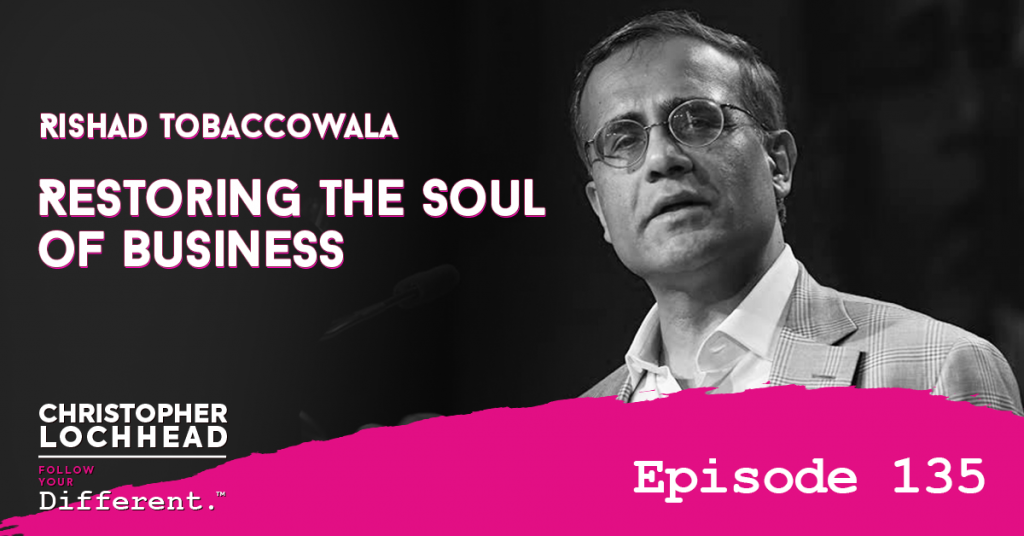
Podcast: Play in new window | Download (Duration: 51:39 — 71.3MB) | Embed
Subscribe: Apple Podcasts | Spotify | Pandora | RSS | More
Today, we feature another great author in this series. Rishad Tobaccowala is the Chief Growth Officer at Publicis Groupe, an advertising and communications firm with 80,000 people! He has a brand new book, Restoring the Soul of Business.
We talk about how business leaders are overly focused on spreadsheets, why the best companies are like religions, the importance of being human beings at work!
Spreadsheet, Story, and Soul
Over the last few years where things are moving extremely fast because of technology, data, financial and twitchiness of time, Rishad shares that companies have started tilting towards the spreadsheet side of the business, which is measurable, data-driven and financial.
However, for Rishad, a successful company is one who can marry both the spreadsheet side of the business and the story of the business, which is about the culture, the purpose, values, emotion, and talent of the company.
“The soul of the business is when you combine the story and the spreadsheet in a way that you have a viable growing business with viable growing people, in a community that is also viable.” – Rishad Tobaccowala
Business Is For Citizens
Rishad believes that its time to optimize the business for the citizen, and not for the consumer. He discussed about this during his talk last January 2019, addressing professionals from Apple, Amazon, Google and Facebook.
“What we’ve created is something incredible in both the empowerment, the connections, and the wealth creation opportunities. At the same stage, there is a downside, which is, increased inequality, increased polarization and to a great extent, a break down of trust. Could it be, that in chasing just the data side of the spreadsheet side, we lost the souls of our businesses?” – Rishad Tobaccowala
The Purpose of A Company
The first one is to ensure that its four constituencies are looked after. The four are
(1) people who they serve – customers, members, users, consumers
(2) the talent that works in the company
(3) community in which the company or the companies offices and factories are based and
(4) the country in which that particular segment of the company is based.
Rishad shares that the 2nd part of the company’s reason to be.
”To generate financial profit which basically allows the company to both reinvest in all those first four criteria, as well as continue to grow because to me, growth is an important thing, but growth measured across those four indicators.” – Rishad Tobaccowala
The third one is how companies create purpose, value, meaning, and connections for life.
To listen more about Rishad’s advice to restore the soul in the business, download and listen to this episode.
Bio:
Rishad is Chief Growth Officer and member of the Management Committee of Publicis Groupe, the world’s third largest communication firm with 80,000 employees.
BusinessWeek named Rishad as one of the top business leaders for his pioneering innovation and TIME magazine dubbed him one of five “Marketing Innovators.
Rishad’s first book “Restoring the Soul of Business: Staying Human in the Age of Data” will be published globally on January 28, 2020.
Re-Inventing blog features some of his writings.
Prior to his current role, Rishad was the Chief Strategist and Member of the Directoire/+ of Publicis Groupe.
Before his corporate role, Rishad was the Chairman of DigitasLBi and Razorfish. Publicis Groupe owns these two global firms, with over 10,000 employees around the world focused on marketing and business transformation.
Rishad has 36 years of experience around the world and helped grow, founded/co-founded or incubated a variety of companies including VivaKi, Leo Burnett, Starcom, SMG Next, Starcom IP, Giant Step, Play, and Denuo.
Rishad has a BS in Mathematics from the University of Bombay and an MBA in Marketing and Finance from the Booth School of Business at the University of Chicago.
Links:
Book: Restoring the Soul of Business: Staying Human in the Age of Data
We hope you enjoyed this episode of Follow Your Different™! Christopher loves hearing from his listeners. Feel free to email him, connect on Facebook, Twitter, Instagram and subscribe on iTunes!
031 8 Stages of Digital Marketing w/ Ryan Deiss
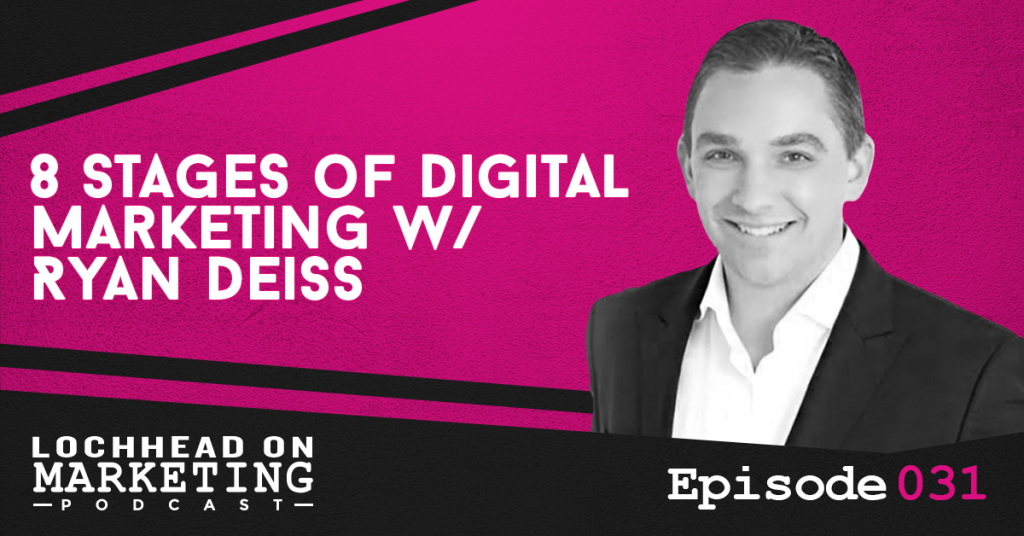
Podcast (lochheadonmarketing): Play in new window | Download (Duration: 43:08 — 59.3MB) | Embed
Subscribe: Apple Podcasts | Spotify | RSS | More
In this episode, we have a thoughtful conversation about how to turbocharge your pipeline and drive revenue with Ryan Deiss, founder of DigitalMarketer.com. He has some provocative and engaging thoughts around what marketers can and should do to drive revenue today.
We talk about the 8 stages of digital marketing and common mistakes marketers do within these stages.
How To Get Attention
Ryan shares that other than creating substantial and valuable content, companies should advertise. Facebook and Google ads are his recommendations because it represents 86% of the total digital ad spent annually.
He also points out the importance of having the right offer, at the right time.
“You have to do great content marketing and then you have to pay to get this great content, noticed.” – Ryan Deiss
8 Stages of Digital Marketing
One of the biggest problems companies do today is: they take a prospect too quickly from “interest” to “HEY BUY NOW.” Ryan teases out, exactly, what marketers need to do to own the whole process from interest to purchase and beyond.
The 8 stages of digital marketing are as follows:
Stage 1 – Awareness
Stage 2- Engagement
Stage 3 – Subscription
Stage 4 – Conversion
Stage 5 – Excitement
Stage 6 – Ascencion
Stage 7 – Advocacy
Stage 8 – Promotion
He discusses each on this episode with easy to digest, real-life examples.
Playing The Blame Game
Ryan also discusses the importance of owning these stages, as this is similar to the customer value journey. Most of the time, Marketing passes leads to Sales, which expects them to close the deal. Sales, on the other hand, know the importance of diligently following the stages and reverts back to Marketing.
He proposes that every company identifies what stage a certain lead is at and work their way around, encompassing other departments such as Product and Customer Care.
“That is what it takes to win today. The companies that do it, they’re just gonna be the ones who will win and the ones who complain this is hard, they will lose.” – Ryan Deiss
To hear more about the 8 stages of digital marketing, download and listen to the episode.
Bio:
Ryan Deiss is a best selling author, founder of multiple companies collectively employing hundreds around the globe, and one of the most dynamic speakers on marketing in the United States today.
He is the founder and CEO of DigitalMarketer.com and Founder and Managing Partner of RivalBrands.com and plattr.com. Ryan is the creator of the “Customer Value Optimization” methodology and have introduced and popularized many of the digital selling strategies that modern companies now take for granted.
Additionally, he is also the founder and host of the Traffic & Conversion Summit, the largest digital marketing conversion conference in North America.
Links:
We hope you enjoyed this episode of Lochhead on Marketing™! Christopher loves hearing from his listeners. Feel free to email him, connect on Facebook, Twitter, Instagram and subscribe on iTunes! You may also subscribe to his newsletter, The Difference, for some amazing content.
134 Wisdom At Work w/ Chip Conley
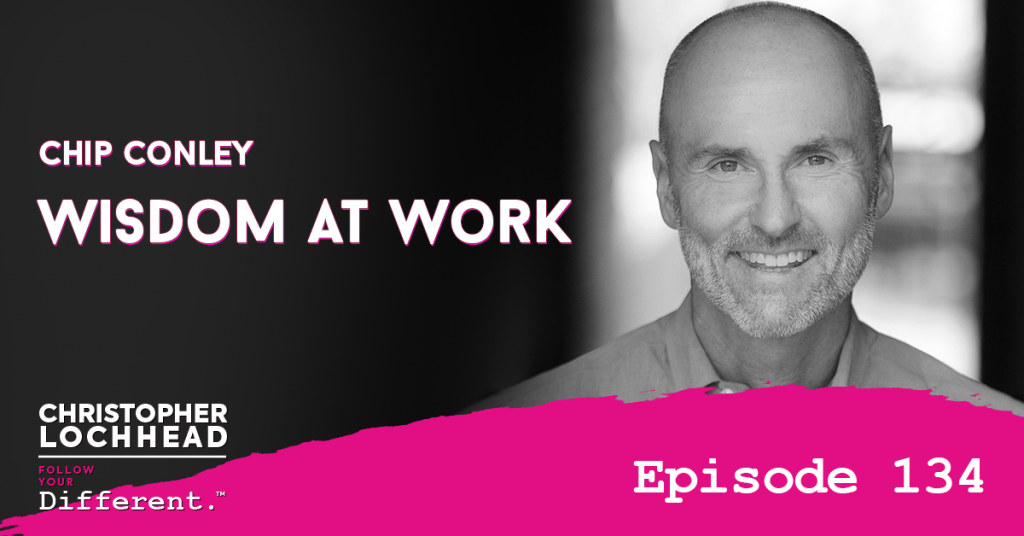
Podcast: Play in new window | Download (Duration: 56:44 — 78.3MB) | Embed
Subscribe: Apple Podcasts | Spotify | Pandora | RSS | More
This is a powerful conversation about mid-life design with Chip Conley. He used to be the CEO of the second-largest based boutique hotel in the US. He then ended up joining Air BNB, to help the young founders of Airbnb navigate their growth in the hospitality category.
Today, we talk about why Chip thinks people at their mid-life need to do a reset. Listen for what Chip calls his “emotional equation” and more ideas, based on Chip’s new book Wisdom at Work.
Boy Wonder to Modern Elder
As we continue our run of legendary authors and entrepreneurs, we converse today with Chip Conley. He’s the founder of Joie de Vivre Hospitality, the second-largest operator of boutique hotels in the United States. He started in 1987 at age 26 and held the position of CEO for nearly 24 years.
In 2010, after having created and managed 50 boutique hotels mostly in California, Conley sold his company. He later joined the young business leaders of Airbnb. Today Air BNB is the company that created and now dominates a new travel category
“I was brought in as the old guy, to help them, because of my hospitality and leadership experience. But they taught me, as much as I taught them.” – Chip Conley
Hard Truths for Midlife Professionals
Chip candidly shares that unfortunately, for a lot of people in midlife and later is, they are not open to being curious.
“They don’t want to look like an idiot at age 45 or 50 and so they’re not actually that open to learning from someone younger than them. Yet, 40% of Americans today have a boss that is younger than them and by the year 2025, the majority of Americans will have a boss younger than them.” – Chip Conley
He further added that we live in an era of digital intelligence. There is an impression that younger people are digital natives. They have more fluency and ability to learn in the digital world, hence tech companies usually hire them for senior roles.
The Modern Elder Academy
People in their midlife often ask, “how do I press the reset button?” Chip shares that one of the reasons why he created the Modern Elder Academy is to have a place for middle age professionals to have a pitstop in their lives.
He stresses the importance of asking the following questions:
“What mastery have I mined? What wisdom have I cultivated and how can I harvest it? How can I repurpose it and frankly, what is it that I really want to do in my life, because I have been living the life that my parents wanted for me to live.” – Chip Conley
To listen more about Chip’s advice to midlife professionals in getting wisdom at work, download and listen to this episode.
Bio:
Chip Conley
The iconic boutique hotelier who helped Airbnb’s founders turn their fast-growing tech start-up into a global hospitality brand, Chip Conley is a New York Times bestselling author whose manifesto on ageism, Wisdom@Work: The Making of a Modern Elder, is inspired by his experience of being both a mentor and an intern in his 50s.
After selling the company he started as a rebel entrepreneur at age 26, Joie de Vivre Hospitality, Chip wasn’t sure what was next. He could have retired at age 52. But the young founders of Airbnb came calling.
He served as Airbnb’s Head of Global Hospitality & Strategy for four years — while also being CEO Brian Chesky’s mentor — and continues today as a Strategic Advisor to the company’s leadership.
While writing Wisdom@Work, Chip was inspired to build the world’s first “midlife wisdom school,” the Modern Elder Academy, with a 3-acre oceanfront campus in Baja California Sur, Mexico.
Chip is an active mentor to six young CEO founders in the hospitality/tech world, and serves on the board of Encore. org and the advisory board for the Stanford Center for Longevity. He believes curiosity is the elixir of life and started learning Spanish and surfing at age 58.
Links:
Modern Elder Academy Interview
We hope you enjoyed this episode of Follow Your Different™! Christopher loves hearing from his listeners. Feel free to email him, connect on Facebook, Twitter, Instagram and subscribe on iTunes! Get amazing, different stories on business, marketing, and life. Subscribe to our newsletter The Difference.
133 New York Times #1 Best Seller Ryan Holiday On Stillness, Wisdom, Faith, Peter Thiel & More
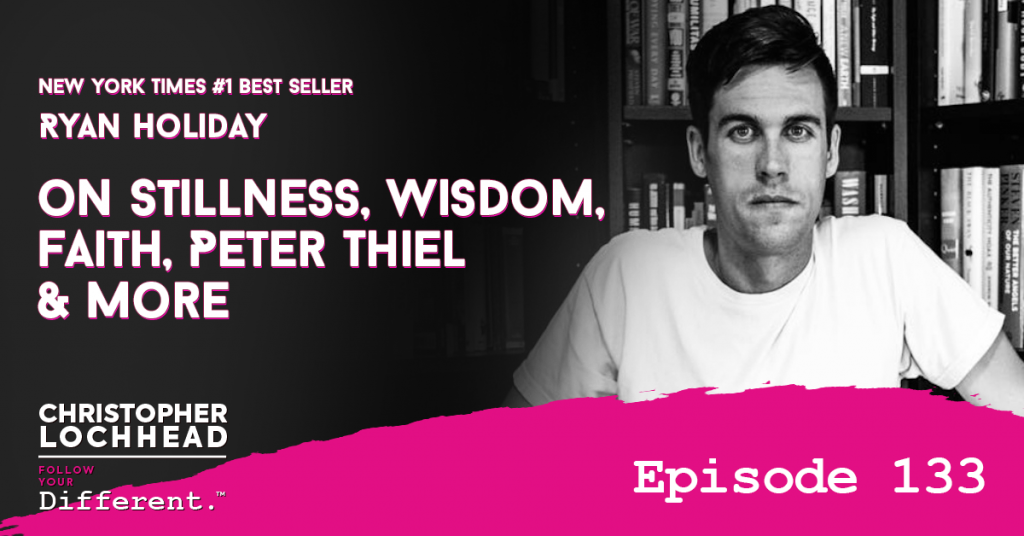
Podcast: Play in new window | Download (Duration: 54:26 — 75.0MB) | Embed
Subscribe: Apple Podcasts | Spotify | Pandora | RSS | More
We continue our run of legendary Authors and today, our guest is NYT #1 Best Selling author Ryan Holiday. Ryan is one of the most important writers of our time and hanging out in his brain, makes you a different person! We talk about stillness, wisdom, faith, Peter Thiel and more!
Interesting Topics
Ryan is the author of Conspiracy: Peter Thiel, Hulk Hogan, Gawker, and the Anatomy of Intrigue. The book is interesting enough as it is about how Paypal founder Peter Thiel took down Gawker Media, through a grand scheme that was founded on the issue with Hulk Hogan. Apparently, Gawker Media publicized an illicitly recorded home sex tape of Hogan.
He also authored the books The Obstacle is the Way, Trust Me, I’m Lying and Growth Hacker Marketing” Ego Is the Enemy. Today, he shares about his recent book Stillness is the Key.
“In stillness, I’m illustrating stoic ideas with stories from Zen philosophy and vice versa. I always want to be seeking out deeper ideas and diverse ideas. I think that’s ultimately how you learn and how you triangulate real truths.” – Ryan Holiday
Old Soul
Christopher remarked how Ryan reminds him so much about Adele, as he is an old soul stuck in a 30-something body. Christopher was astounded with his choice of topics ranging from Rome, Greece, Ancient History and the like. He is none like his contemporaries who are busy with social media and mindless online content.
“I got an advise a long time ago that you should write what you’re afraid about, or write what you are unsure about.” – Ryan Holiday
Probably one controversial part of the book is the discussion about faith.
“Part of this idea of surrender is saying ‘you know what, I’m going to accept this uncertainty a little bit. I will accept that this isn’t all about me, that I don’t know everything. I’m going to accept that there is “something” operating behind the scenes that have an agenda or perspective, or indifference to a regular human problem or issue.” – Ryan Holiday
Stillness
Ryan shares how his conversation went with the publishers for his new book. He says he does not claim it as The Ryan Holiday philosophy as he merely translated and popularized the tried and tested ideas of smart people
To listen more about what Ryan learned while doing marketing for fallen fashion brand “American Apparel” and more on faith, wisdom and stillness, download and listen to this episode.
Bio:
Ryan Holiday is one of the world’s foremost thinkers and writers on ancient philosophy and its place in everyday life.
He is a sought-after speaker, strategist, and the author of many bestselling books including The Obstacle Is the Way; Ego Is the Enemy; and The Daily Stoic.
His books have been translated into over 30 languages and read by over two million people worldwide. He lives outside Austin, Texas, with his family.
Links:
Good Reads – Stillness is the Key
We hope you enjoyed this episode of Follow Your Different™! Christopher loves hearing from his listeners. Feel free to email him, connect on Facebook, Twitter, Instagram and subscribe on iTunes!

